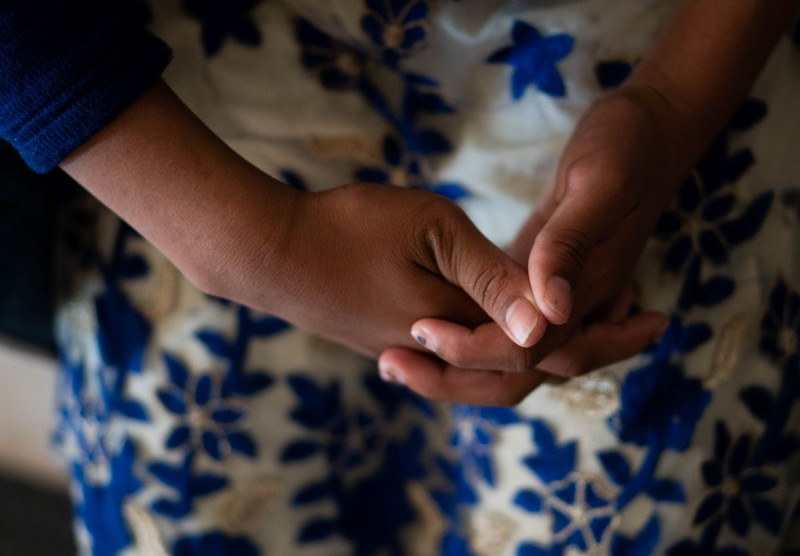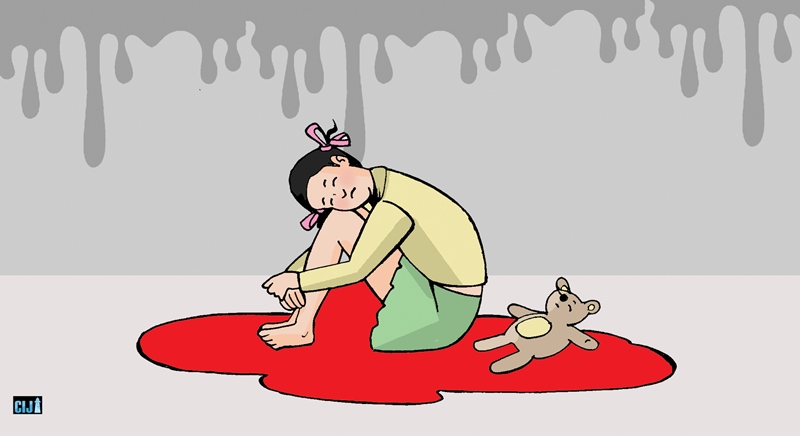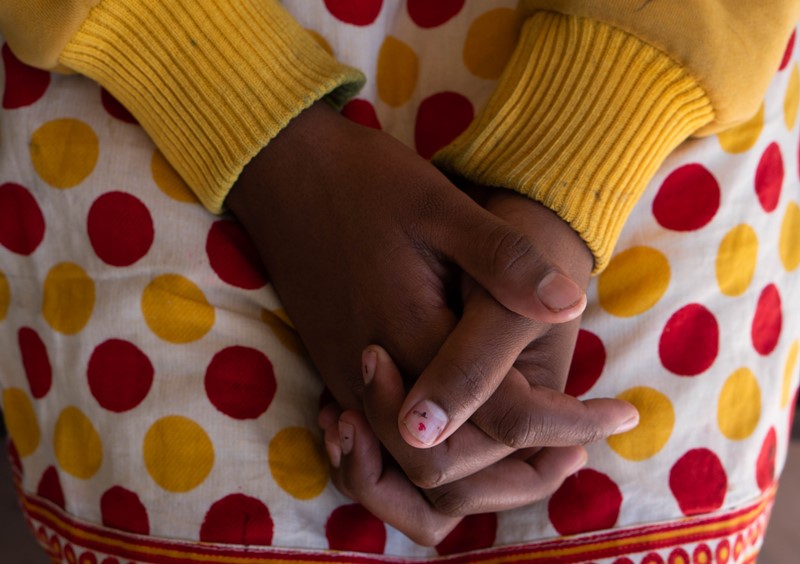Every day, four girls fall victim to rape in Nepal, yet the government has failed to assume responsibility for the well-being of these girls and their children, who are already abandoned by both family and society.
Durga Rana Magar |CIJ Nepal
Sapana Nepali was seen wandering alone in Pokhara. A kind couple took her in as she looked weak and pregnant. Sapana, who was not even 14 years old, then suffered from labour pain. The couple took her to a hospital and registered as an adult. However, her physical identity was that of an adolescent. After the hospital staff questioned her, it was found that she was raped at the age of 13. The hospital then informed police, which arrested the rape accused.
Sapana’s case is currently under consideration at the District Court, Kaski. Until the decision is made by the court, a non-government organization has given her refuge. But she doesn’t know where she will stay and do after the decision. Rehabilitation of rape victims is a moral responsibility of family, society and the state. However, Nepal does not have a single institution, which takes guardianship of girls like Sapana.

Sapana was still living at the safe house in the first week of Poush. She was sad when she pointed towards her son in her arms and said, “I was this small when my mother left me. My father used to come home drunk and beat me.” When her father brought another woman to her home as the second wife, Sapana then left the village. She did not have a single penny and supportive friends and family. As she spent many nights in the city’s streets, she found work at a hotel. She was then raped by the owner of the same hotel. Sapana was so afraid that neither she could retaliate nor flee.
After the incident, she gathered strength to inform the owner’s wife of what had happened. However, the wife kicked her out of the hotel. Sapana then had nowhere to go, while the size of her pregnant belly was increasing. With no help in sight, she went to her maternal uncle’s home. However, her uncle assaulted her and kicked her in the stomach instead of helping.
Following that, Sapana started sleeping in the streets when the kind couple in Pokhara took her to their home. The couple had a disabled child. It turned out that they wanted to adopt Sapana’s baby. Therefore, they had increased her age at the hospital’s registration, which would have allowed them to adopt the child without any hassle from police. As that did not happen, they turned their back toward Sapana.
When she feels lonely at the safe house, Sapana calls her maternal grandmother, who cannot visit her because of the old age. And, Sapana cannot visit her uncle’s home. Girls from Sapana’s age are going to school but she cannot even write her name properly. When asked if she wants to go to school, she answered, “I feel ashamed to go to school as a child’s mother.”
Girls like Sapana and their children born from rape are not protected and rehabilitated by the government, which not just pushes them away from rehabilitation in society but their basic needs are also not met. On the other hand, cases of rape and violence have not decreased in number.
Perpetrators everywhere
Mamata Thakuri from Chitwan-13 said that her father is in jail and mother lives with her family from the second marriage. She said that she was raped last year by her own father. According to Spokesperson of Nepal Police, Kuber Kadayat, girls in the age range of 11-16 are highly vulnerable to be sexually violated by their own relatives and acquaintances.
While Mamata was asleep at night, she felt as if somebody was pushing her down. When she opened her eyes, she felt that her father was doing “something.” As she felt extreme pain, she tried to scream but her father pushed his hand against her mouth and said, “Just keep quiet, else you will get beaten up.” Mamata became silent and spent the night crying. The next day, she shared her agony with a neighbour, after which police arrested her father.

Mamata wants to become a police officer. But she does not have supportive family members or relatives. As her father is now jailed, she is being blamed by her family. When girls who do not even understand the meaning of rape are being blamed by their family and society instead of getting support, their suffering increases. Bina Silwal, a women’s rights activist said, “Our society is misogynistic. The whole society does everything it can to save the rapist, while it blames the victimized girl.” She added that girls are insecure in their own family.
According to Nepal Police, there are 1 thousand 515 cases of rape in the fiscal year 2079-80, in which the victims are girls below the age of 18. This figure includes 259 cases of girls below the age of 10; 944 cases of girls between 11-16 years of age; and, 312 cases of girls between the ages of 17 and 18. The figure shows that in average, there are 4 girls raped in Nepal each day. Just this year, there are 228 cases of girls being raped registered with police.
Girls victimized by rape and violence tend to become silent because of fear and shame and this silence can become destructive. Kaski’s 15 years old Sunita had to go through such agony. She was attempting to commit suicide by hanging from a window when her neighbour rescued her. She was unconscious when she was taken to the hospital. After the treatment, she said that she was raped since a long time. The owner of the hotel where she worked came to her room after he forcefully opened the door. He then raped her, which continued for a long period. She could not find anybody to confide her pain, hence she attempted suicide.
In the past five years, 7 thousand 553 cases of girls being raped have been registered with Nepal Police. But none of the institutions have any record of pregnant girls and children born from these cases.
17 years old Sabita Bhandari from Tanahu was studying in class 10 when a relative from her village took her to a corner and raped her. The rapist threatened her that he would kill her parents if she disclosed this incident anywhere. So, Sabita kept quiet and tolerated rape time and again. As she used to have an irregular menstruation cycle, her family did not notice that she did not have menstruation for nine full months. One day he felt a terrible stomach ache and was taken to the hospital. Only then, the family discovered that she was having labour pain.
The rapist is in jail now. However, Sabita’s parents did not accept to bring her and her toddler to their family home. They gave away the child to a couple without children. Sabita often weeps, remembering her daughter. But as it is already difficult to survive by herself, she cannot take care of the baby. Now, she wants to go to Kathmandu and complete her education.
The Act Relating to Children, 2075 (2018) ensures every child to be protected, cared for and loved by their parents, family and guardians. However, raped girls neither get protection nor proper care and love. Some of the girls we met are taking care of their children themselves. Some have given away their children to orphanages, while others have asked childless couples to adopt their children.
The girls who have been forced to raise their children themselves, are going through an extremely difficult time. They are doing any menial jobs they get, while some are even begging in the streets. How would these mothers who are struggling day in and day out with shattered mental and physical health, give appropriate care to their children? Nobody has cared to monitor the condition of the children who are taken away for adoption.
Safe house – a distant dream
The government planned to build province-level safe houses for women and girls who survived violence. The women and girls would then be rescued in emergencies and brought to these safe house as a temporary measure. However, the safe houses have not been built yet in any of the provinces. Indu Ghimire, Joint Secretary of Ministry of Women, Children and Senior Citizens said, “The safe houses were to be built with the joint initiative of Asian Development Bank and Government of Nepal. But we have not been able to build them due to various factors.”
There are many government affiliated agencies that work in the field of women and girls. Some of them are: One Door Crisis Management Centre, Women, Children and Senior Citizens Service Centre, Local Child Rights Committee, Provincial Child Rights Committee, National Child Rights Council, Child Helpline, Child Welfare Officer, etc. Nevertheless, these agencies have not been able to do enough for the protection of girls who survived violence.

Spokesperson of Nepal Police, Kuber Kadayat said, “There are strict laws in case of girls who face violence. When they come to the police, they do get justice. But after that we do not have a clear answer. We do not have safe houses. There are not strong mechanisms to rehabilitate the girls in terms of their education, health, family and society.
Mohana Ansari, a lawyer who works in the field of human rights commented that in most cases of violence against women, victims do not get justice. She said, “In Nepali society, women are not safe. The victims themselves are blamed.” She added that without equal opportunities in every phase of life and equal treatment, it is difficult for women and girls to lead a respectable life.
Shiva Khakurel, Coordinator of the Gandaki Province chapter of Informal Sector Service Centre (INSEC) said that with the social structure to treat women and girls as second class citizens, violence against them will not stop. He added that according to INSEC’s study, rapes are high in number among incidents of violence against girls.
Although the constitution has ensured the right to a protected and healthy life, the government has not been able to implement this minimum requirement to lead a life as a human being. Our daughters are living in fear, pressure and violence.



